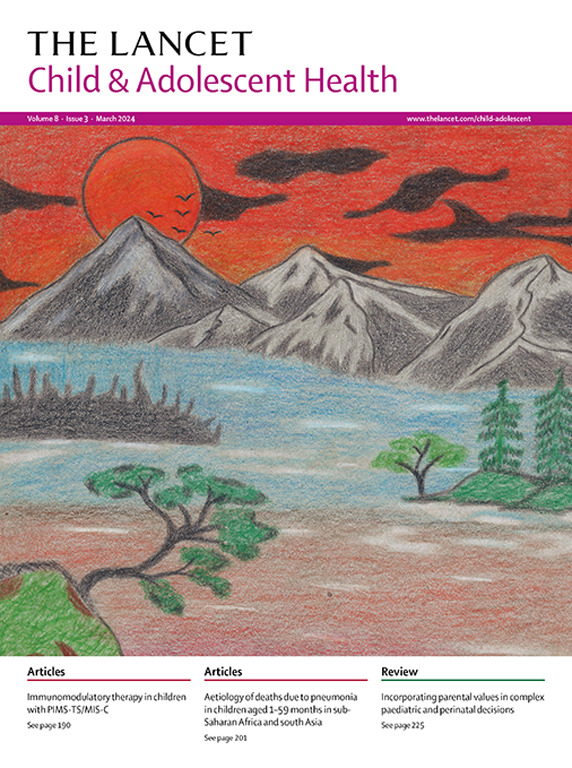妊娠期二价预融合F疫苗接种和英国婴儿呼吸道合胞病毒住院:一项多中心、检测阴性、病例对照研究的结果
IF 15.5
1区 医学
Q1 PEDIATRICS
引用次数: 0
摘要
呼吸道合胞病毒(RSV)是全球6个月以下婴儿急性下呼吸道感染(ALRI)的主要原因。一种母体二价RSV预融合F (RSVpreF)疫苗于2024年夏末(苏格兰8月12日,英格兰9月1日)引入英国,所有怀孕28周或以上的孕妇都有资格接种疫苗。我们的目的是了解RSVpreF疫苗在现实世界中的有效性。本文章由计算机程序翻译,如有差异,请以英文原文为准。
Bivalent prefusion F vaccination in pregnancy and respiratory syncytial virus hospitalisation in infants in the UK: results of a multicentre, test-negative, case-control study
Background
Respiratory syncytial virus (RSV) is the leading cause of acute lower respiratory infections (ALRI) in infants younger than 6 months globally. A maternal bivalent RSV prefusion F (RSVpreF) vaccine was introduced to the UK in late summer in 2024 (August 12 in Scotland and September 1 in England), with all pregnant women at 28 weeks or more of gestation eligible for vaccination. We aimed to understand RSVpreF vaccine effectiveness in a real-world setting.
Methods
We conducted a multicentre, test-negative, case-control study to analyse the vaccine effectiveness of maternal RSVpreF vaccination against the primary outcome of hospitalisation (ie, admission to hospital) for RSV-associated ALRI in infants. Patient and public involvement from a group of parents informed the study protocol design. Included patients were infants with ALRI born after Aug 12, 2024 (Scotland), and Sept 1, 2024 (England), and therefore had mothers eligible for maternal vaccination, who were admitted to 30 hospital sites across the UK from Sept 30, 2024, to Jan 20, 2025, and tested for RSV. Infants were followed up until hospital discharge or death as an inpatient. Primary vaccine effectiveness of maternal RSVpreF vaccination against RSV-associated hospitalisation was calculated with the use of a conditional logistic regression adjusted by site, calendar month of hospital attendance for the infant, age, preterm birth, and sex.
Findings
We included 537 mother–infant pairs, in whom there were 391 RSV-positive infant cases (median age 1·63 months [IQR 0·94–2·26]) and 146 RSV-negative infant controls (1·41 months [0·77–2·03]). Of 537 recruited infants, 297 (55%) were male and 240 (45%) were female. Ethnicity data were available for 533 mothers, of whom 434 (81%) self-identified as White. The mothers of 73 (19%) RSV-positive cases and 60 (41%) RSV-negative controls had received RSVpreF vaccine before delivery. The adjusted effectiveness of maternal RSVpreF vaccination for preventing infant hospitalisation was 58% (95% CI 28–75) for infants whose mothers were vaccinated at any time before delivery and 72% (48–85) for infants whose mothers were vaccinated more than 14 days before delivery (39 [11%] of 357 RSV-positive cases vs 43 [33%] of 129 RSV-negative controls).
Interpretation
In the real-world setting of the first season of vaccine implementation in England and Scotland, maternal RSVpreF vaccination was effective and equivalent to trial settings in reducing the risk of hospitalisation in infants with RSV-associated ALRI.
Funding
National Institute for Health and Care Research, The Wellcome Trust, and Imperial College London.
求助全文
通过发布文献求助,成功后即可免费获取论文全文。
去求助
来源期刊

Lancet Child & Adolescent Health
Psychology-Developmental and Educational Psychology
CiteScore
40.90
自引率
0.80%
发文量
381
期刊介绍:
The Lancet Child & Adolescent Health, an independent journal with a global perspective and strong clinical focus, presents influential original research, authoritative reviews, and insightful opinion pieces to promote the health of children from fetal development through young adulthood.
This journal invite submissions that will directly impact clinical practice or child health across the disciplines of general paediatrics, adolescent medicine, or child development, and across all paediatric subspecialties including (but not limited to) allergy and immunology, cardiology, critical care, endocrinology, fetal and neonatal medicine, gastroenterology, haematology, hepatology and nutrition, infectious diseases, neurology, oncology, psychiatry, respiratory medicine, and surgery.
Content includes articles, reviews, viewpoints, clinical pictures, comments, and correspondence, along with series and commissions aimed at driving positive change in clinical practice and health policy in child and adolescent health.
 求助内容:
求助内容: 应助结果提醒方式:
应助结果提醒方式:


